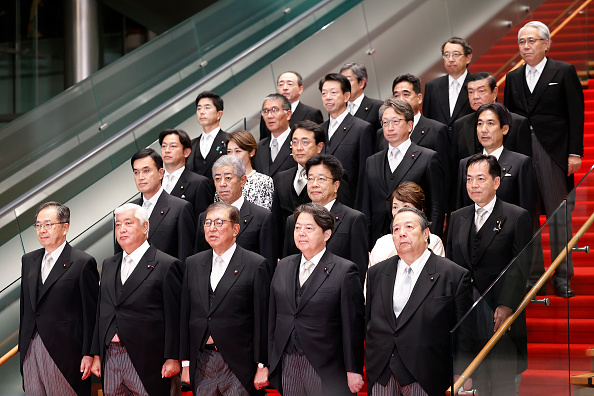ARTICLES
2024.10.29 NEWS ARTICLES
Has Japan Lost Its Political Stability?
Why Did They Lose?
The LDP (the Liberal Democratic Party) and Komeito coalition have lost their majority in the Diet House of Representatives on Sunday (Oct. 27, 2024). The result shocked the global investors who saw Japan as the most stable society among the developed world. I myself thought first, albeit narrowly, the coalition government would be able to maintain a majority.
But by a week before the general elections, outcome was foreseeable, after the party and Prime Minister Ishiba made a series of mistakes.
Rather, according to the last minute media survey, even the worst case scenario existed for them… the LDP might come in the second place. But since the Asahi Newspaper Poll was out, conservative constituencies felt the actual risks of government change, and showed up to vote.
It is the worst performance since 2009, when the LDP lost the government, but this time, for a different reason.
In 2009, voter turnout surged dramatically, reaching nearly 70%. However, this time it fell short of even 54%, marking the third-lowest post WWII turnout. So the question is, who stayed at home?
Most likely, it was the reluctant supporters of the LDP and the core fans of the late former prime minister Abe Shinzo. The reluctant LDP supporters didn’t like the political funding scandals, while Abe’s supporters likely wanted to signal their disapproval of the Ishiba administration, which they perceived vengeful against the Abe faction.
Despite different motivations, these two groups—the reluctant supporters and Abe’s core fans—share a common concern: the economy.
Those desiring strong economic growth and robust international presence may have been discouraged by the government’s pre-election promises to distribute funds to low-income households, because most of them are the elderly people who have more asset than the younger people, and also, they didn’t like its emphasis on prioritizing rural support.
It's Economy Stupid! (...and Security of course)
Ishiba’s decision to focus the election debate on domestic issues was a critical mistake. Although he was confident in his popularity as a centrist socially and economically, he overlooked that the LDP’s greatest strength lies in its pragmatic stance on foreign policy and security.
As long as the campaign’s focus remained on domestic issues, the administration could not avoid judgment over the funding scandals. During the election, reports have surfaced that party funds were provided to the local party organization connected to the candidates with scandals, who had been denied official endorsement by the party, further fueling the controversy.
Misreading these points, and explaining the snap election merely as advantageous timing, were strategic errors. Japanese voters appreciate aspirational narratives; they’re not swayed by blunt reasoning alone.
Moreover, the recent election of a veteran centrist politician and former prime minister Noda Yoshihiko as leader of the Constitutional Democratic Party (CDP) likely gave independent voters confidence to support them.
However, it’s important to note that this was not a clear victory for the CDP. While they performed well in closely contested electoral districts, their proportional votes didn’t see significant growth.
Instead, it was the Democratic Party for the People, which pledged to increase the net income of working-age households, that gained a considerable boost in proportional votes. Additionally, a relatively new populistic leftist party, Reiwa, with its emphasis on tax cuts, also managed to increase its seats.
PM Ishiba Declares He Won't Resign
After the election, PM Ishiba states that he intends to stay on in office. Nobody knows if Ishiba is to be persuaded to resign or not. One thing sure is that even the biggest opposition party, CDP, cannot form a government, since the second biggest opposition party, Japan Innovation Party (Ishin), holds very different ideologies.
Over the next month, behind-the-scenes negotiations will likely focus on the selection of a prime minister and the potential for a coalition government. This is an unprecedented situation, and a change in prime minister is certainly within the realm of possibility.
Along with the predictable attempt to rally five conservative independents, the administration will also need to seek support from the Democratic Party for the People and the Japan Innovation Party. However, with the upper house election on the horizon next year, these parties will be reluctant to risk weakening their standing, making a quick agreement unlikely.
With or without Ishiba, the next administration might be a weak minority administration. This would mean that with every budget proposal and bill, the government would need to consult with these parties for approval.
Realistically, it’s unlikely Ishiba administration could survive until the upper house election next summer. Within the party, the only formal mechanism to oust the newly appointed leader would be through a vote of no confidence for the cabinet, which would expose the LDP’s vulnerability and pave the way for an opposition-led government. It is very unlikely for the party to risk a split.
The Revolving Door PMs, Likely?
The risk of returning to a series of short-lived administrations certainly exists. With Abe gone, there is a risk that the media will become more inclined to topple administrations easily; a single misstep could lead to a downward spiral.
While a change of government is one possible path, it’s doubtful that the comparatively less cohesive CDP could sustain a stable, long-term government.
This is, indeed, an era without a clear leader.

